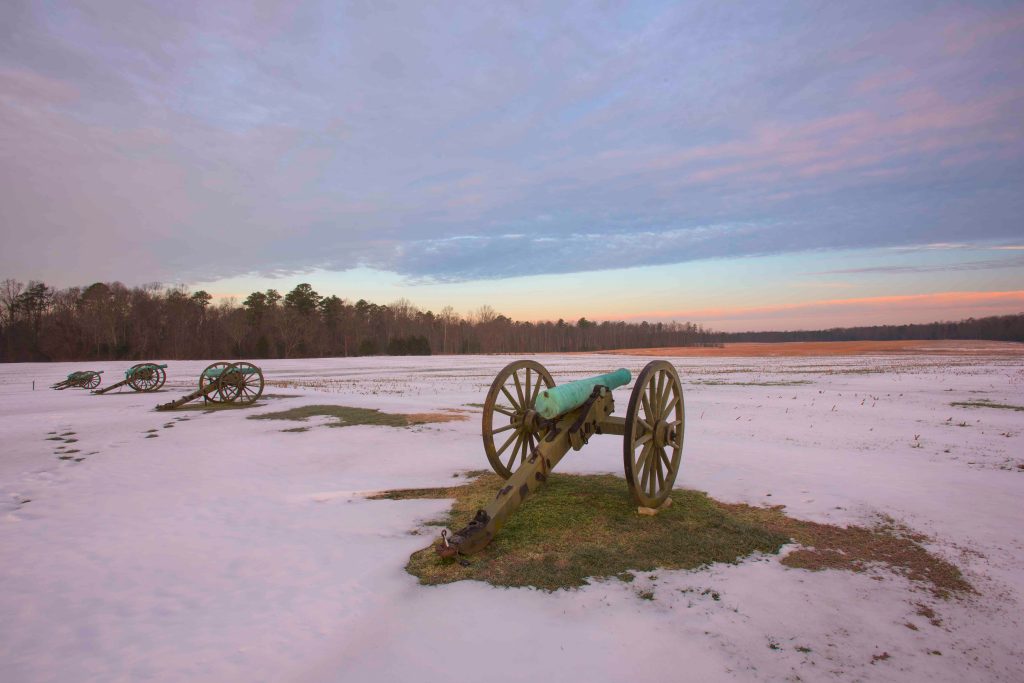A Thousand Words a Battle: Malvern Hill
Battle of Malvern Hill, The Seven Days
July 1, 1862

It had been a solid week of fighting and General Lee was impatient. His army had pushed General McClellan’s Union forces away from Richmond, but Lee wanted more, he wanted to destroy, not defeat, the Union army. His last chance would be at Malvern Hill, where the Federals made a final stand before moving to the James River.
Lack of good maps, poor communication, and unclear orders delayed Confederate attacks until late afternoon, but when they came, they came with fury. Advancing across about a mile of open ground toward Union troops on the crest, they were under artillery fire the entire way, and as they closed in they came within rifle range.
One of the units defending the ridge was the 83rd Pennsylvania. They, like the other Union troops defending the ridge, had no cover: no fences, stone wall, trees, or shrubbery. No natural swales. They stood in the open firing and reloading as the Confederates closed in. Sergeant William John Wittich’s actions stood out this day. The following account comes from the regiment’s Orderly Book.
At the battle of Malvern Hill, his regiment, which during the day was occupied in supporting a battery, was at 5 in the after-noon ordered to the extreme front to assist in checking the attack of the enemy fast becoming furious. The solid columns of the rebels had approached to with a hundred yards of the regiment and the batteries in its rear when a terrible storm of grape and bullets broke their first line and drove [them] scattered & straggling backwards upon the second. In their flight, they left a stand of colors. Young Wittich observed them, obtaining the permission of his captain, he darted in front of the regiment, passed diagonally along its whole front from right to left, under an incessant fire from batteries and muskets of both sides, quietly laid his gun in a little hollow, advanced to the brow of the hillock where the rebels had broken, seized the flag almost from their very grasp, raised it over his head and walked deliberately back to his place in the ranks unharmed by a hostile or friendly bullet. He was made Lieutenant on the field for his gallantry. At the grand review of the Army on the 4th of July following, he was brought out at the head of his regiment, prostrate with fever and the trophy of his daring was ordered by his General of Brigade to be lashed to his ambulance.
This flag is now deposited at the War Department in Washington and bears inscribed upon it the name of its brave captor. He survived his sickness to fall at the Second battle of Bull Run. On the morning of the second day after the fight, his twin brother, Sergt. In the same Co., who had been severely wounded, was attempting to drag himself from the field. He had not proceeded ten paces from the spot where he had lain for two nights and a day when he came upon the corpse of his brother, his feet upwards and his face to the foe. He covered him with his blanket and left to an unknown burial as brave a soldier and as glorious a youth as this Rebellion has numbered among its victims.
The 83rd Pennsylvania had been warmly engaged a few days earlier at Gaines’s Mill, and would later help defend Little Round Top at Gettysburg. Yet at Malvern Hill they saw some of their most desperate fighting of the war.[1]
— Bert Dunkerly
[1] 83rd Pennsylvania Regimental Orderly Book, National Archives
I’ve walked this field. On the east side of the Union position, on the side Jackson’s men faced, there is actually a great deal of “dead ground”, where an attacking force could approach under significant cover. But for whatever reason, Jackson never “pushed” during the Seven Days.
Thanks for publishing so many interesting pieces; I get new insights from each one I read. But could someone please proofread the articles before they go online? After 40+ years in publishing, I know these small errors stand out more to me than to most people. But they also slow a reader down, take away from the professionalism of a piece, and sometimes even change the meaning. I’ll volunteer for the job, if that would help.
Glad you like our site, Elizabeth. What did you spot was wrong with this article?
Unfortunately, I didn’t make notes, and the only one I remember has been corrected (“sold” instead of “solid”’in the first sentence).
I read this again on a different device, and it’s perfect. My guess is that the font didn’t translate well on the first device, causing letters and spaces to close up (hence, “sold” rather than “solid”). Thanks again for the informative articles, and I apologize for my earlier post.